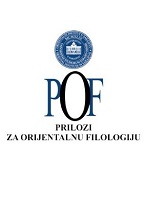Zadužbine Ferhad-paše Sokolovića kao impuls kulturnog i intelektualnog resursa Banje Luke: Prva javna biblioteka
The endowment of Ferhad Pasha Sokolović as an impulse of the cultural and intellectual resources of Banja Luka: The first public library
Author(s): Sabaheta GačaninSubject(s): Cultural history, Museology & Heritage Studies, Library operations and management, Social development, 16th Century
Published by: Orijentalni Institut u Sarajevu
Keywords: Ferhad Pasha’s endowment; Banja Luka; 16th century; cultural history; public library; cultural canon;
Summary/Abstract: This paper examines the relationship between the establishment of libraries in Banja Luka and the urban Islamic culture of the city, which started a new chapter in its development with the appointment of Ferhad Pasha’s endowment in 1578. It is undisputed that this endowment transformed Banja Luka into a city. This was accompanied by the relocation of the seat of the administrator of Bosnia from Sarajevo to Banja Luka. This established the first Islamic urban agglomeration. The appearance of a public library can only be explained as a response to the needs of an urban community, whose intellectual development followed its urban and economic rise as a regional centre. Banja Luka was a town provided by Ferhad Pasha’s endowment with all the preconditions for developing into a strong cultural centre. This endowment included a considerable amount of money, as well as sources of revenue, which established a network of Islamic institutions of upper level, such as a mosque, masjids, different commercial and infrastructural facilities, and so on. Ferhad Pasha was also actively involved in the cultural development of the city. He was himself an avid reader. By 1630, slightly more than 40 years following the establishment of Ferhad Pasha’s versatile endowment, these institutions created a lasting, supportive cultural climate, where numerous endowers left book collections to be used by scholars, intellectuals, students and booklovers. The most notable ones include the collection endowed by qadi Muslihuddin Kninjanin, whose waqfnama was lost, and the collection endowed by Mevla Husamuddin Bošnjak. On the basis of Husamuddin’s collection, we can reconstruct the scholarly, literary and cultural canon present in Banja Luka at the time. It was developed indirectly, through a favourable constellation of urban structures and Ferhad Pasha’s endowment. A reconstruction of the library profile shows that the dominant cultural canon in Banja Luka, and thus in Bosnia, was in compliance with the cultural canon of Istanbul, following the hanefi-maturrid teaching and intellectual Sufism, established during the rule of Sultan Suleiman and immediately after that (1550-1600). It has been established that it was pashas and other men educated at the Court (educated at university-type madrasas in the capital, as well as in Enderun, conveyed the canon and established in the cities they founded and developed into major urban and cultural centres) were the leading patrons of intellectual Sufism – of the type we see in the works of Ibn Arabi, Rumi, and in Ibn Sina’s philosophy, so that they, in a way, globalised the intellectual legacy across the Ottoman state. The library as an institution of cultural memory is the best reflection of the dominant canon of a community and an era. Therefore, a reconstruction of its content provides a historical context of the leading principles of a cultural code.
Journal: Prilozi za orijentalnu filologiju
- Issue Year: 2017
- Issue No: 66
- Page Range: 111-133
- Page Count: 23
- Language: Bosnian

